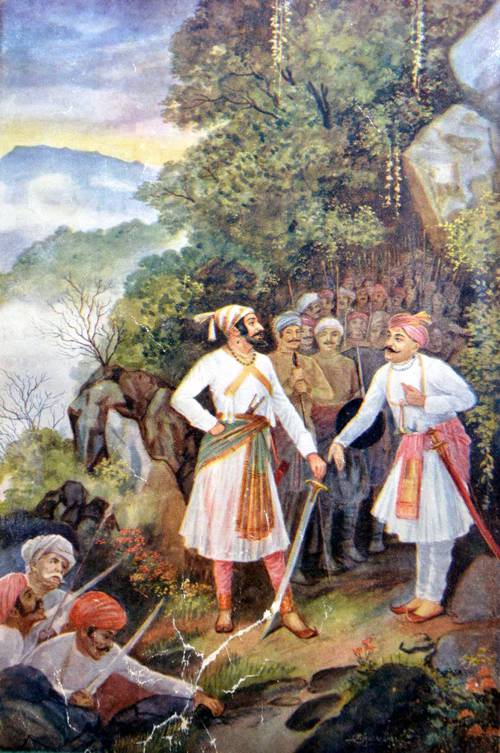
FAQ About Chhatrapati Shivaji Maharaj

Who was Chhatrapati Shivaji Maharaj?
Chhatrapati Shivaji Maharaj was a prominent Indian ruler who founded the Maratha Empire in the 17th century. Born in 1630 in the Shivneri Fort near Pune, he is celebrated for his progressive and strategic governance and is remembered for his innovative military tactics and promotion of regional languages and Hindu political traditions.

What was the significance of Shivaji's upbringing in shaping his leadership?
Shivaji's upbringing was crucial to his development as a leader. Raised by his mother Jijabai in a politically charged environment, he was instilled with a deep sense of spiritual and moral responsibility. His tutor, Dadoji Konddeo, also played a significant role in teaching him military skills and statecraft.

How did Shivaji establish the Maratha Empire?
Shivaji established the Maratha Empire by consolidating a robust and efficient military regime and employing guerrilla warfare tactics. He strategically captured forts and used his naval forces to secure territories along the Konkan coast, exploiting the fragmented political landscape of the Deccan region during the decline of the Adil Shahi and Mughal empires.

What are some notable military tactics used by Shivaji?
Chhatrapati Shivaji Maharaj was known for his strategic use of guerrilla warfare, which included swift surprise attacks and strategic retreats. He employed a highly mobile cavalry and maintained an effective network of spies to gather intelligence on enemy movements, enabling his forces to strike selectively and exploit weaknesses.

What role did forts play in Shivaji's empire?
Forts were critical to Shivaji's military strategy. He built and maintained several strategically located forts across Western India, which served as secure bases for his troops. Forts like Raigad, Pratapgad, and Sinhagad played pivotal roles in defending against enemy invasions and establishing control over the region.

How did Shivaji Maharaj promote regional languages and culture?
Shivaji Maharaj promoted regional languages and culture by emphasizing Marathi in his court and administration. He also patronized regional art and culture, ensuring that local traditions flourished under his rule. His promotion of vernacular languages helped strengthen regional identity and unity against foreign invasions.

What was Shivaji's approach to governance?
Shivaji's approach to governance was highly progressive for his time. He implemented efficient administrative reforms, established a council of ministers known as the Ashtapradhan, and promoted welfare policies to alleviate the hardship of his subjects. His governance was marked by religious tolerance and a focus on justice.

How did Shivaji's reign impact the Mughal Empire?
Shivaji's reign significantly challenged the Mughal Empire, particularly their control over Southern India. His military campaigns and raids destabilized Mughal authority in the region, forcing them to divert resources and attention to fortify their southern dominions, which ultimately weakened their grip.

What is Shivaji's legacy in modern India?
Shivaji's legacy in modern India is profound. He is revered as a symbol of resistance against tyranny and oppression. His leadership style, military tactics, and promotion of a centralized government are studied in Indian military and administrative contexts. His efforts in establishing 'Swaraj' continue to inspire discussions on self-governance and cultural pride.

Why is Chhatrapati Shivaji Maharaj considered a visionary leader?
Chhatrapati Shivaji Maharaj is considered a visionary leader because of his exceptional foresight in military strategy and governance. He built a strong and independent state amidst hostile forces, implemented progressive policies, and laid a foundation for the effective administration of his empire, ensuring its resilience against powerful adversaries.

What were some challenges Shivaji faced in establishing his empire?
Shivaji faced numerous challenges, including threats from surrounding Sultanates and the expansive Mughal Empire. He had to overcome internal disputes among local chieftains, consolidate Marathi-speaking regions, and deal with economic constraints while assembling a loyal and disciplined military force.

How did Shivaji Maharaj ensure the loyalty of his troops and subjects?
Shivaji maintained the loyalty of his troops and subjects through equitable treatment, timely rewards, and personal charisma. He led by example, participating in ground battles and showing genuine concern for the welfare of his people, which reinforced strong loyalty and respect across his ranks.

What reforms did Shivaji introduce in administration?
Shivaji introduced several reforms, including the establishment of an efficient revenue system and land surveys to maintain records. He organized his administration into a systematized hierarchy and introduced the Ashtapradhan, a council of eight ministers to aid in effective governance, which ensured smooth administrative processes.

What is the significance of the coronation of Shivaji as Chhatrapati?
The coronation of Shivaji as Chhatrapati in 1674 symbolized the formal establishment of the Maratha sovereignty. It was an assertion of independence from Mughal rule, enhancing his legitimacy as a monarch among his people, and setting the stage for the Maratha Empire to emerge as a formidable power in the Indian subcontinent.

Did Shivaji Maharaj have any successors?
Yes, Shivaji was succeeded by his sons, Sambhaji and Rajaram. Sambhaji took over the reins after Shivaji's death in 1680 and continued to expand and defend the Maratha territories against the Mughal Empire until his capture and execution in 1689. Rajaram then became the leader and continued the fight against the Mughals.

How did Shivaji Maharaj promote religious tolerance?
Shivaji Maharaj was known for his policy of religious tolerance, which was evident in his respect for different faiths and protection offered to non-Hindus. He employed Muslims in his army and administration and ensured that places of worship belonging to other religions were not harmed during his campaigns.

What role did Shivaji's family play in his rise to power?
Shivaji's family, especially his mother Jijabai, played an instrumental role in his rise to power. Jijabai's teachings laid a strong foundation of values and inspired Shivaji’s ambitions. His father Shahaji Bhosale's military position also provided important resources and early exposure to politics and warfare.

How did Shivaji Maharaj handle diplomacy with neighboring states?
Shivaji adeptly used diplomacy along with military strength. He formed strategic alliances and avoided prolonged conflicts when beneficial. He often engaged in treaties that provided temporary peace to manage threats from more powerful neighbors and to buy time to strengthen his own forces.

What were Shivaji Maharaj's contributions to cultural development?
Shivaji contributed to cultural development by promoting Marathi literature and arts, supporting architectural development, and ensuring his court patronized scholars and artists. His efforts in cultural patronage helped preserve and advance regional art forms and cultural identity during a time of political upheaval.
